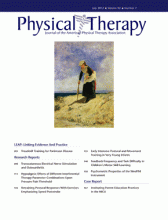Abstract
Background and Purpose Infants born preterm are at high risk of developmental disabilities and benefit from early developmental intervention programs. Physical therapists with neonatal expertise are ideally suited to educate parents about ways to support their infant's development in the first months of life. However, administrative policies are needed to support the therapist in providing adequate parent education in the neonatal intensive care unit (NICU). This administrative case report describes the process used by a team of neonatal therapists to evaluate clinical practice, determine the need for change, and develop and implement a new parent education program in the NICU.
Case Description Physical therapy parent education practices were evaluated in an academic medical center with a 36-bed, level-3 NICU. Physical therapists with neonatal expertise covered multiple units within the hospital each day. A series of focus groups, a small descriptive study, and staff discussion were used to evaluate parent education practices in this academic medical center. A new parent education program was developed based on data collected and literature to improve clinical care.
Outcomes The new parent education model was implemented over the course of several months using overlapping initiatives. Administrative support for the change was developed through collaboration, open communication, and presentation of clinical data. In addition, this hospital-based program contributed to the development of a statewide initiative to educate parents of preterm infants about the importance of supporting development in the first months of life.
Discussion A collaborative and data-driven approach to evaluating parent education practices supported the development of a new parent education practice while acknowledging the need to meet staff productivity standards and provide excellent care throughout the hospital.
Footnotes
All authors provided concept/idea/project design, writing, data collection, and participants. Dr Dusing provided data analysis, project management, and fund procurement. The authors thank the NICU staff, physical therapy and occupational therapy staff and management, and Infant and Toddler Connection, Early Intervention Prematurity Workgroup members who contributed to this project. Special thanks to Daniel Riddle, PT, PhD, FAPTA, who provided early feedback on the manuscript.
This project was approved by the Institutional Review Board of Virginia Commonwealth University.
Focus groups and case series included in the project were funded by a Clinical Research Feasibility Fund (CReFF) Grant (NCRR/NIH M01 RR00065) from the General Clinical Research Center, Virginia Commonwealth University. Manuscript preparation was funded, in part, by NIH/NCMRR/NICHD/NINDS grant 1K12HD055931-01 and Maternal and Child Health Bureau grant T73MC00040.
- Received October 24, 2011.
- Accepted March 22, 2012.












